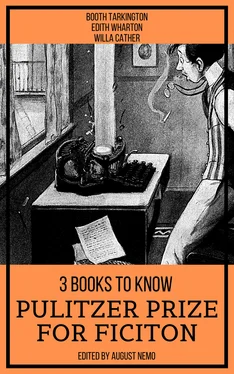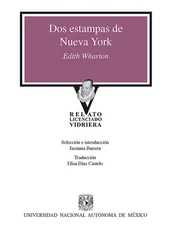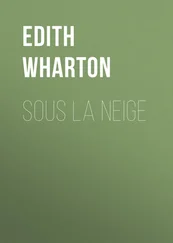In this temper he emerged from behind the house nearest to his own, and, glancing toward the street, saw his mother standing with Eugene Morgan upon the cement path that led to the front gate. She was bareheaded, and Eugene held his hat and stick in his hand; evidently he had been calling upon her, and she had come from the house with him, continuing their conversation and delaying their parting.
They had paused in their slow walk from the front door to the gate, yet still stood side by side, their shoulders almost touching, as though neither Isabel nor Eugene quite realized that their feet had ceased to bear them forward; and they were not looking at each other, but at some indefinite point before them, as people do who consider together thoughtfully and in harmony. The conversation was evidently serious; his head was bent, and Isabel's lifted left hand rested against her cheek; but all the significances of their thoughtful attitude denoted companionableness and a shared understanding. Yet, a stranger, passing, would not have thought them married: somewhere about Eugene, not quite to be located, there was a romantic gravity; and Isabel, tall and graceful, with high colour and absorbed eyes, was visibly no wife walking down to the gate with her husband.
George stared at them. A hot dislike struck him at the sight of Eugene; and a vague revulsion, like a strange, unpleasant taste in his mouth, came over him as he looked at his mother: her manner was eloquent of so much thought about her companion and of such reliance upon him. And the picture the two thus made was a vivid one indeed, to George, whose angry eyes, for some reason, fixed themselves most intently upon Isabel's lifted hand, upon the white ruffle at her wrist, bordering the graceful black sleeve, and upon the little indentations in her cheek where the tips of her fingers rested. She should not have worn white at her wrist, or at the throat either, George felt; and then, strangely, his resentment concentrated upon those tiny indentations at the tips of her fingers—actual changes, however slight and fleeting, in his mother's face, made because of Mr. Eugene Morgan. For the moment, it seemed to George that Morgan might have claimed the ownership of a face that changed for him. It was as if he owned Isabel.
The two began to walk on toward the gate, where they stopped again, turning to face each other, and Isabel's glance, passing Eugene, fell upon George. Instantly she smiled and waved her hand to him; while Eugene turned and nodded; but George, standing as in some rigid trance, and staring straight at them, gave these signals of greeting no sign of recognition whatever. Upon this, Isabel called to him, waving her hand again.
“Georgie!” she called, laughing. “Wake up, dear! Georgie, hello!”
George turned away as if he had neither seen nor heard, and stalked into the house by the side door.
He went to his room, threw off his coat, waistcoat, collar, and tie, letting them lie where they chanced to fall, and then, having violently enveloped himself in a black velvet dressing-gown, continued this action by lying down with a vehemence that brought a wheeze of protest from his bed. His repose was only a momentary semblance, however, for it lasted no longer than the time it took him to groan “Riffraff!” between his teeth. Then he sat up, swung his feet to the floor, rose, and began to pace up and down the large room.
He had just been consciously rude to his mother for the first time in his life; for, with all his riding down of populace and riffraff, he had never before been either deliberately or impulsively disregardful of her. When he had hurt her it had been accidental; and his remorse for such an accident was always adequate compensation—and more—to Isabel. But now he had done a rough thing to her; and he did not repent; rather he was the more irritated with her. And when he heard her presently go by his door with a light step, singing cheerfully to herself as she went to her room, he perceived that she had mistaken his intention altogether, or, indeed, had failed to perceive that he had any intention at all. Evidently she had concluded that he refused to speak to her and Morgan out of sheer absent-mindedness, supposing him so immersed in some preoccupation that he had not seen them or heard her calling to him. Therefore there was nothing of which to repent, even if he had been so minded; and probably Eugene himself was unaware that any disapproval had recently been expressed. George snorted. What sort of a dreamy loon did they take him to be?
There came a delicate, eager tapping at his door, not done with a knuckle but with the tip of a fingernail, which was instantly clarified to George's mind's eye as plainly as if he saw it: the long and polished white-mooned pink shield on the end of his Aunt Fanny's right forefinger. But George was in no mood for human communications, and even when things went well he had little pleasure in Fanny's society. Therefore it is not surprising that at the sound of her tapping, instead of bidding her enter, he immediately crossed the room with the intention of locking the door to keep her out.
Fanny was too eager, and, opening the door before he reached it, came quickly in, and closed it behind her. She was in a street dress and a black hat, with a black umbrella in her black-gloved hand—for Fanny's heavy mourning, at least, was nowhere tempered with a glimpse of white, though the anniversary of Wilbur's death had passed. An infinitesimal perspiration gleamed upon her pale skin; she breathed fast, as if she had run up the stairs; and excitement was sharp in her widened eyes. Her look was that of a person who had just seen something extraordinary or heard thrilling news.
“Now, what on earth do you want?” her chilling nephew demanded.
“George,” she said hurriedly, “I saw what you did when you wouldn't speak to them. I was sitting with Mrs. Johnson at her front window, across the street, and I saw it all.”
“Well, what of it?”
“You did right!” Fanny said with a vehemence not the less spirited because she suppressed her voice almost to a whisper. “You did exactly right! You're behaving splendidly about the whole thing, and I want to tell you I know your father would thank you if he could see what you're doing.”
“My Lord!” George broke out at her. “You make me dizzy! For heaven's sake quit the mysterious detective business—at least do quit it around me! Go and try it on somebody else, if you like; but I don't want to hear it!”
She began to tremble, regarding him with a fixed gaze. “You don't care to hear then,” she said huskily, “that I approve of what you're doing?”
“Certainly not! Since I haven't the faintest idea what you think I'm 'doing,' naturally I don't care whether you approve of it or not. All I'd like, if you please, is to be alone. I'm not giving a tea here, this afternoon, if you'll permit me to mention it!”
Fanny's gaze wavered; she began to blink; then suddenly she sank into a chair and wept silently, but with a terrible desolation.
“Oh, for the Lord's sake!” he moaned. “What in the world is wrong with you?”
“You're always picking on me,” she quavered wretchedly, her voice indistinct with the wetness that bubbled into it from her tears. “You do—you always pick on me! You've always done it—always—ever since you were a little boy! Whenever anything goes wrong with you, you take it out on me! You do! You always—”
George flung to heaven a gesture of despair; it seemed to him the last straw that Fanny should have chosen this particular time to come and sob in his room over his mistreatment of her!
“Oh, my Lord!” he whispered; then, with a great effort, addressed her in a reasonable tone: “Look here, Aunt Fanny; I don't see what you're making all this fuss about. Of course I know I've teased you sometimes, but—”
Читать дальше












